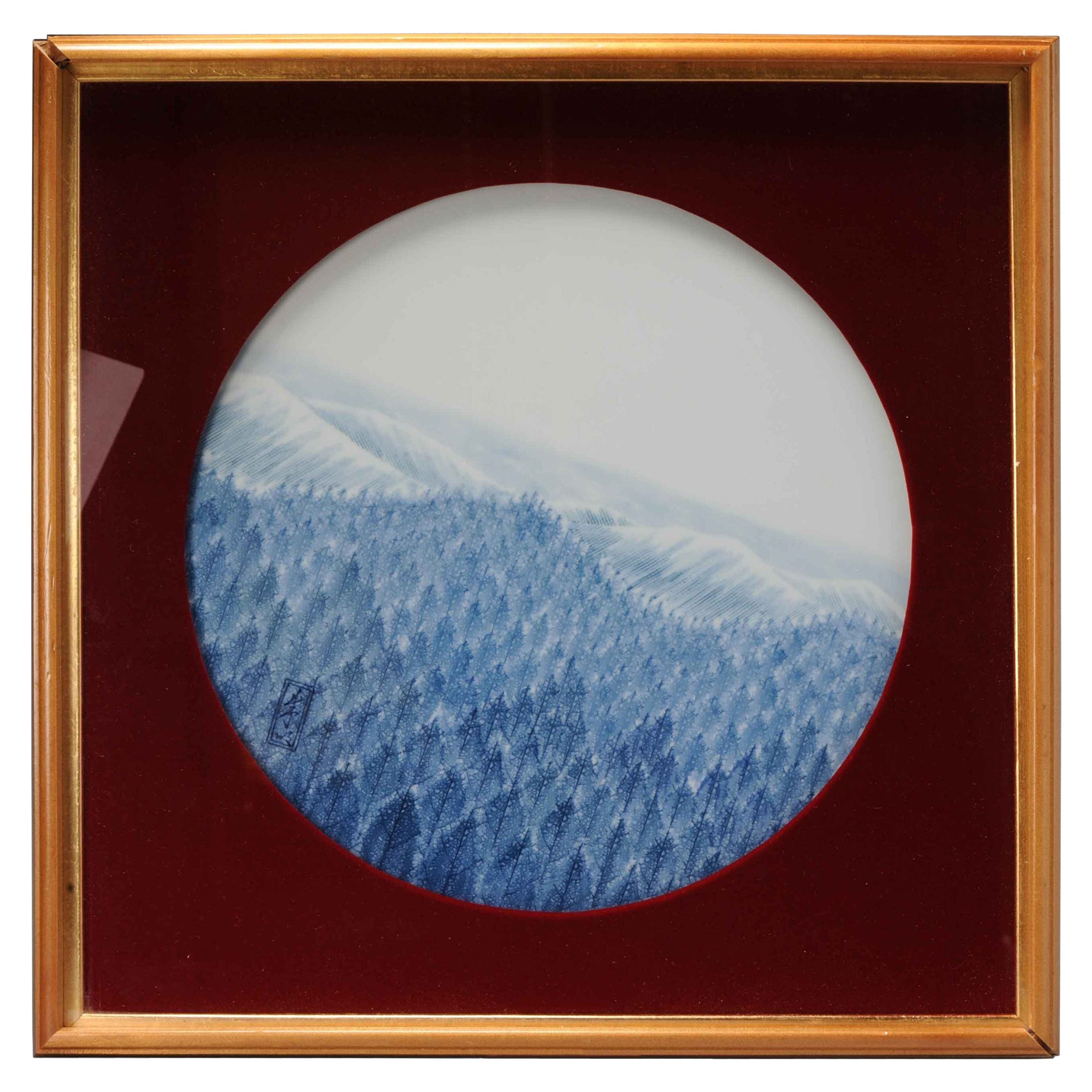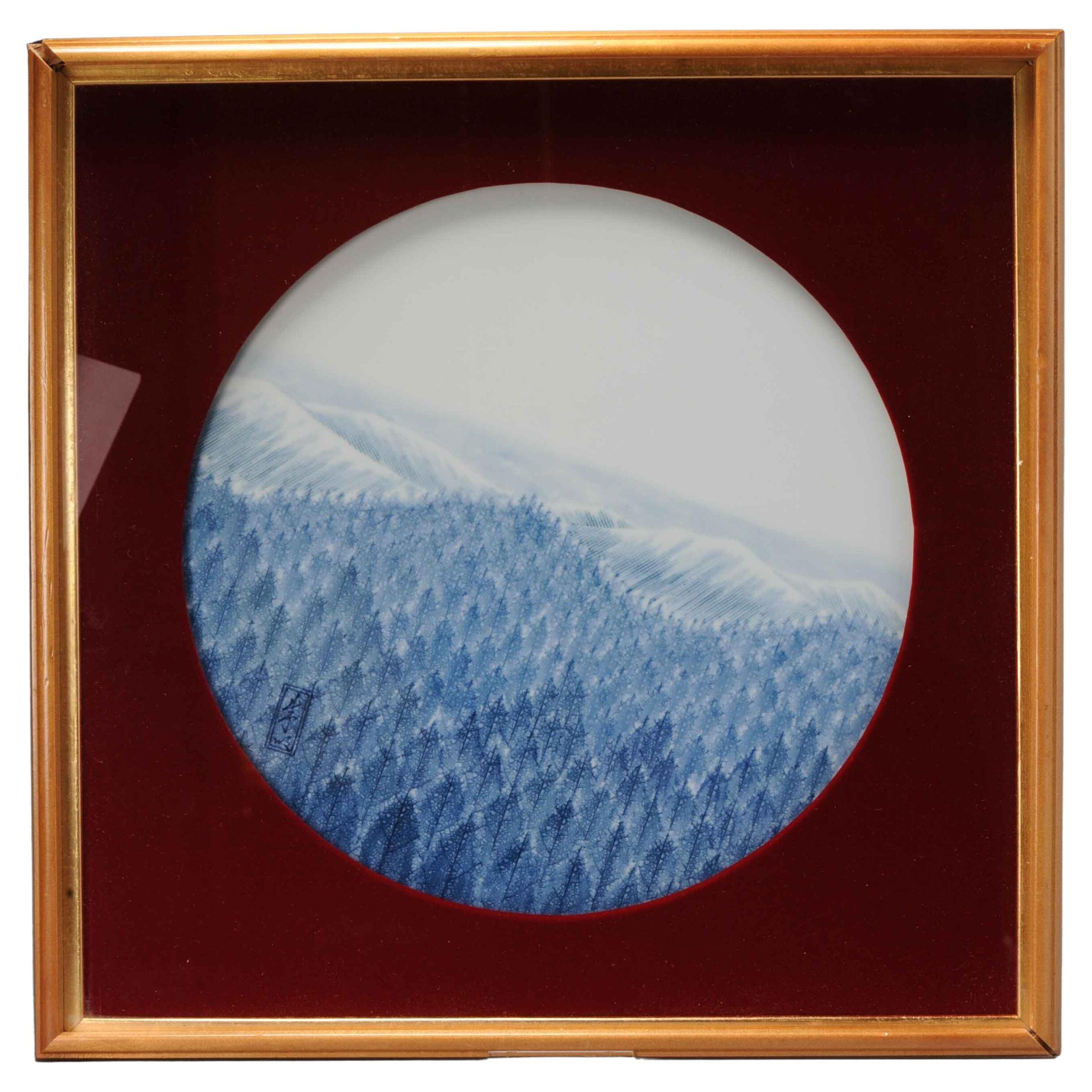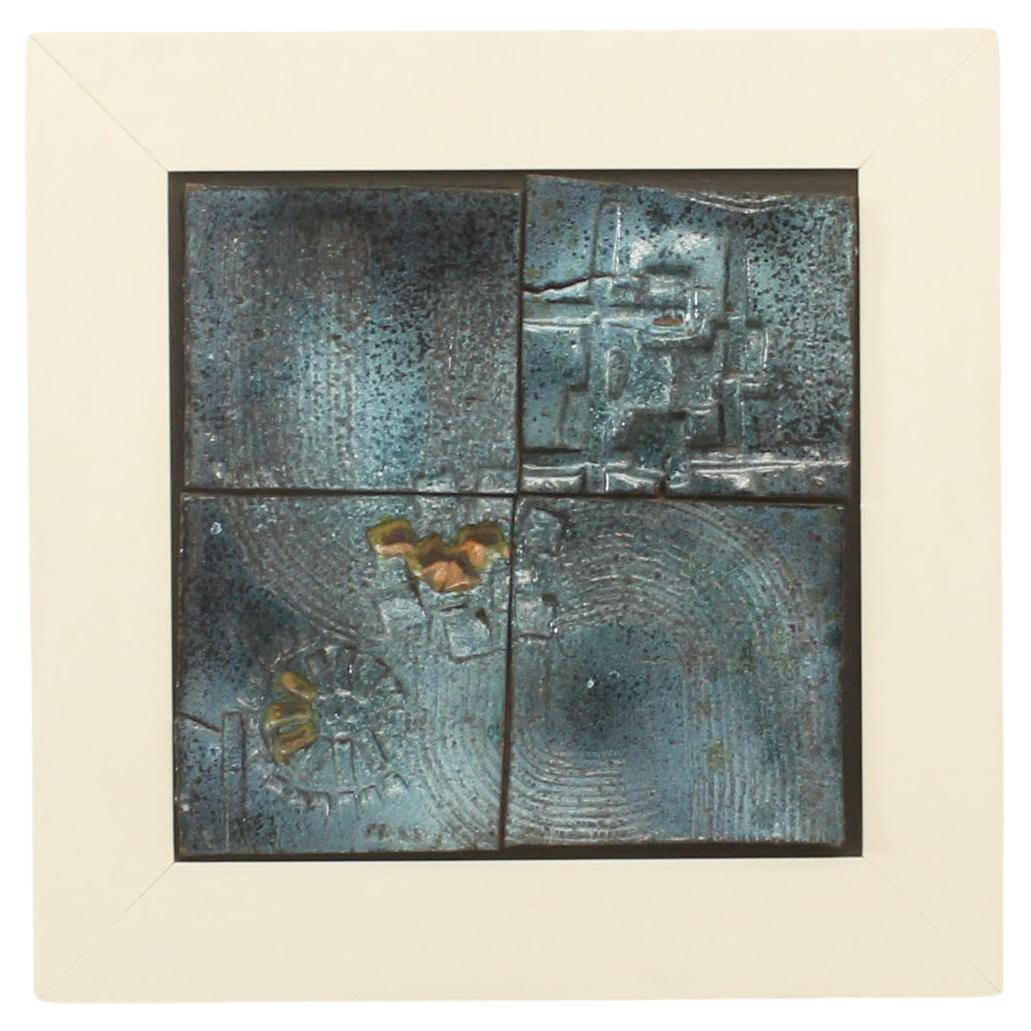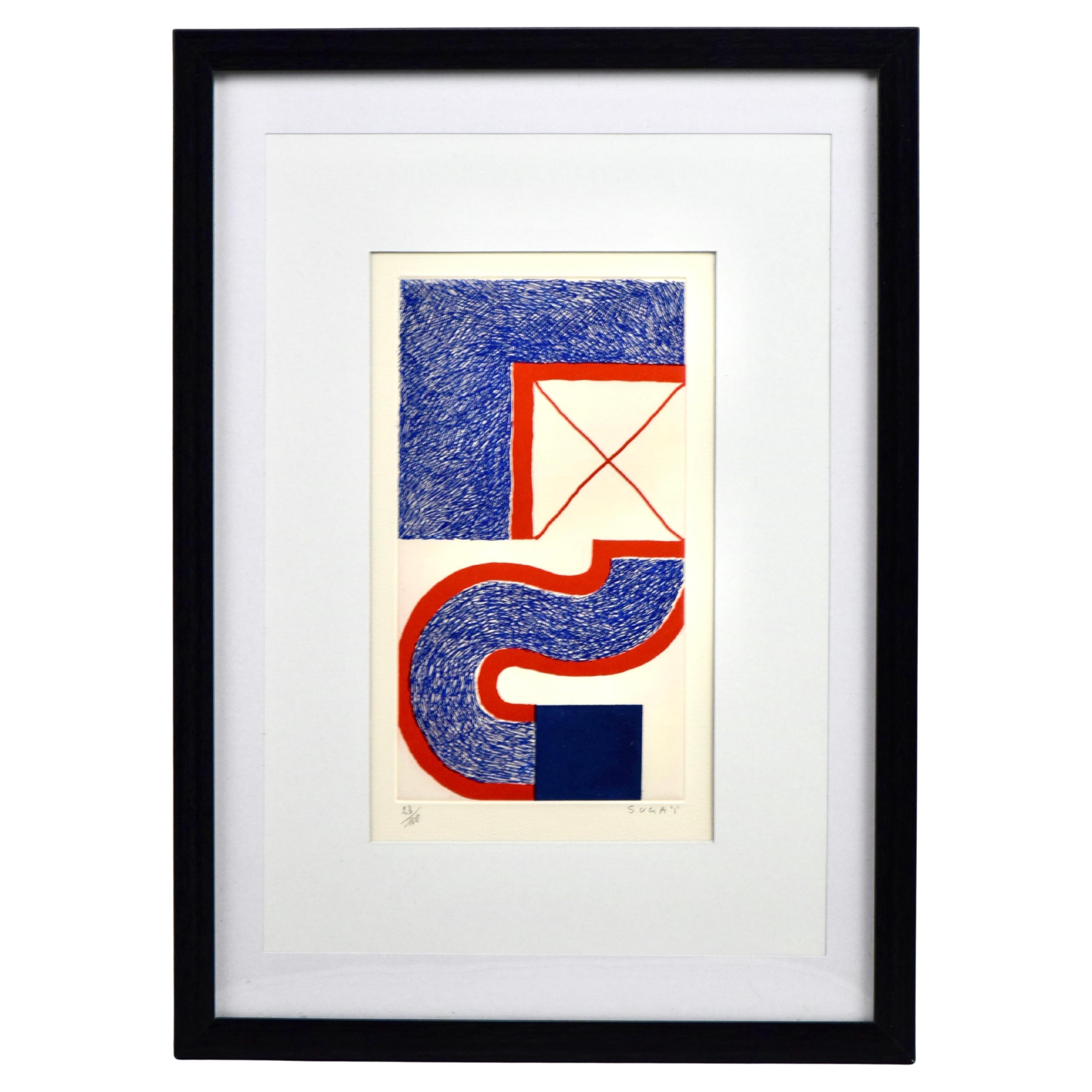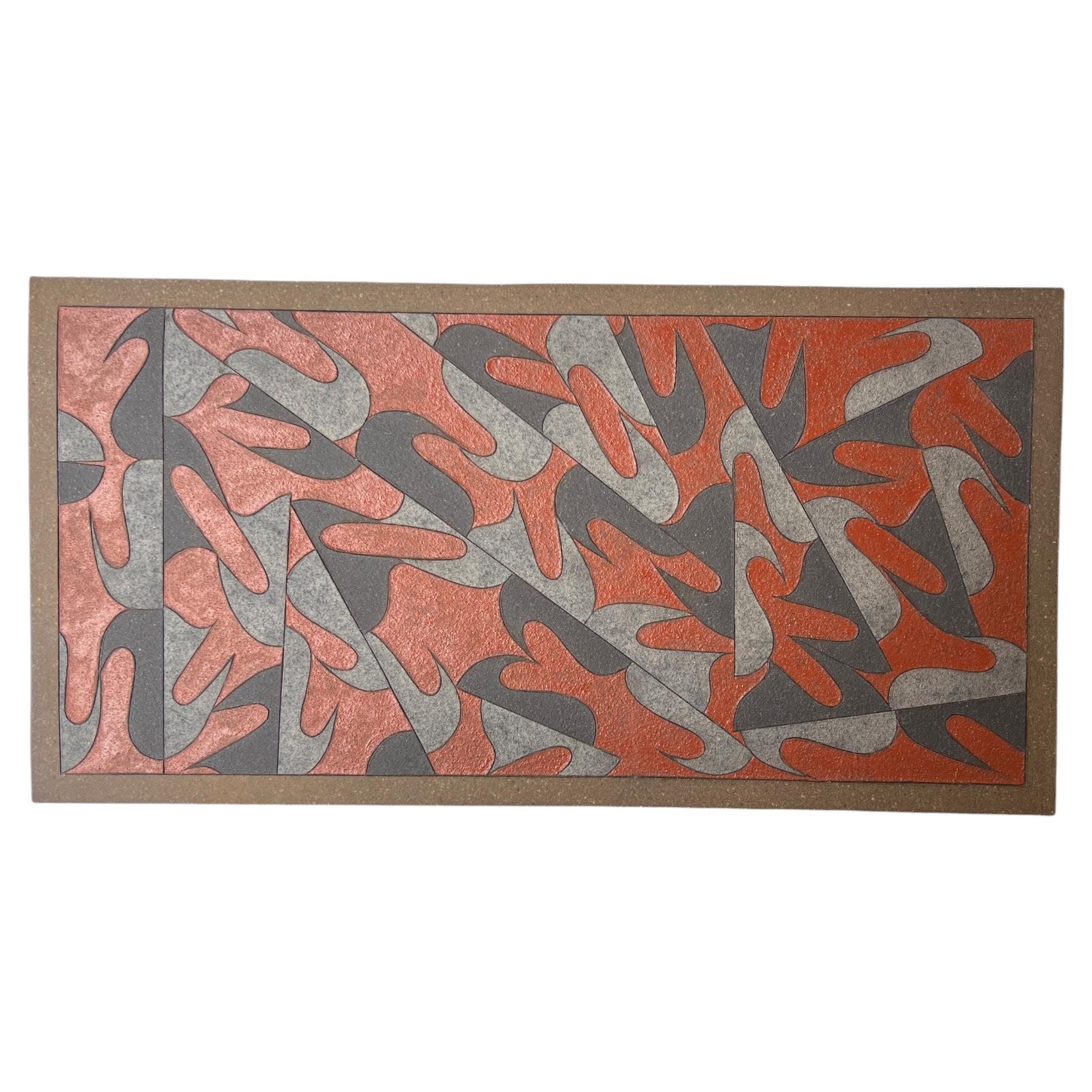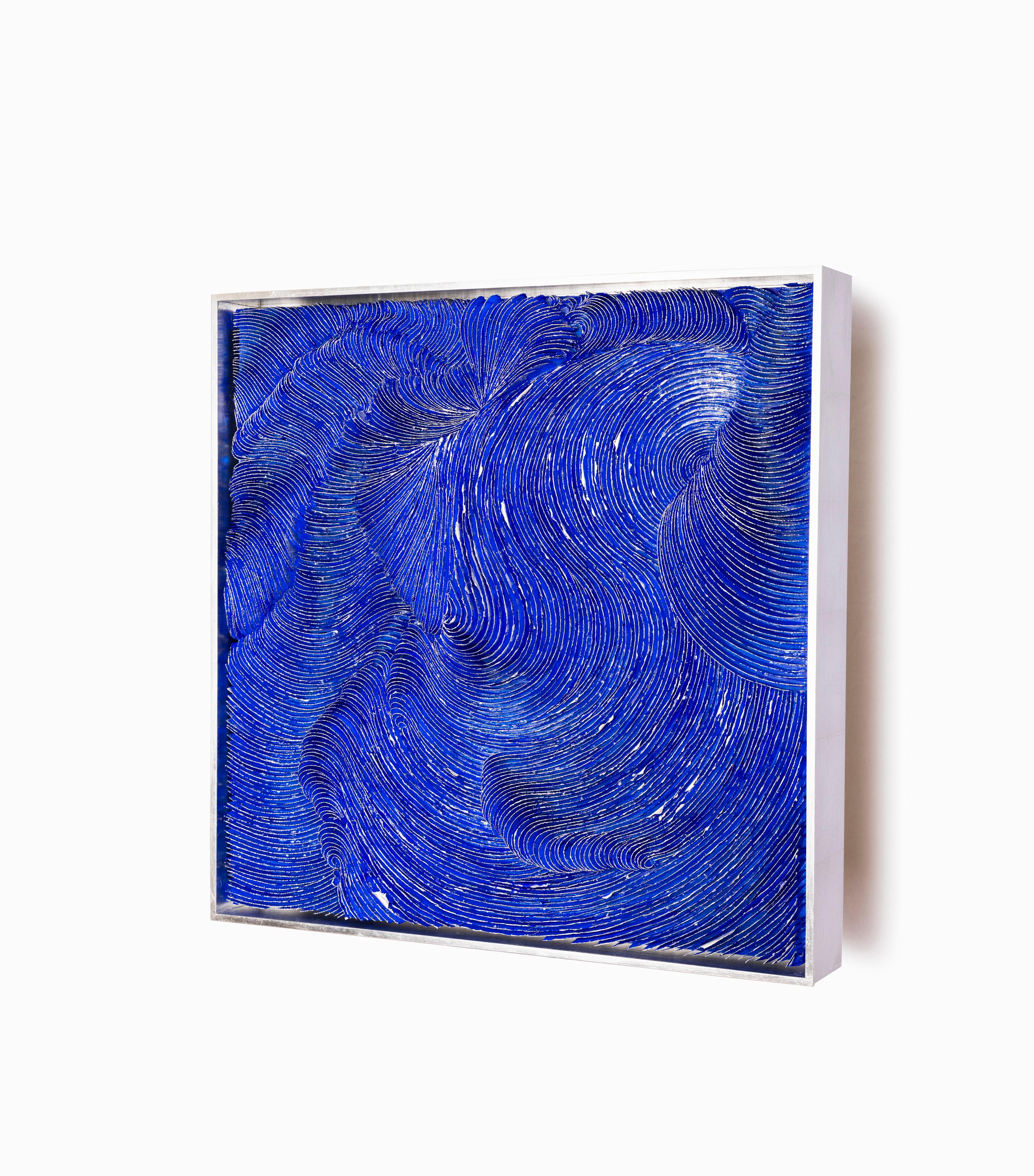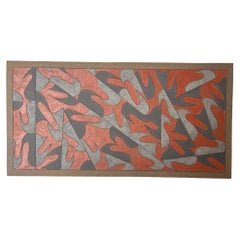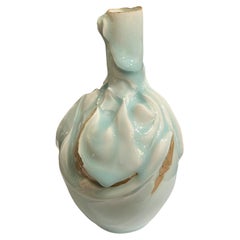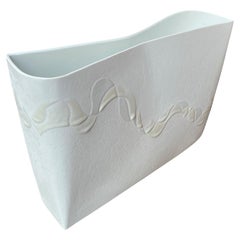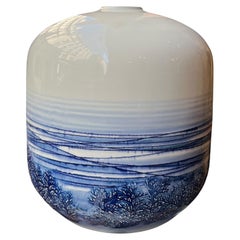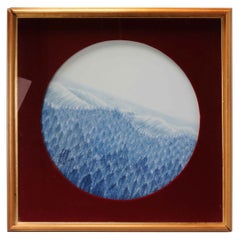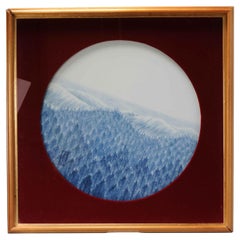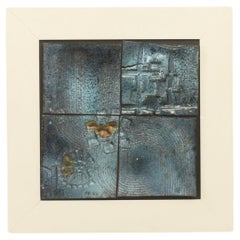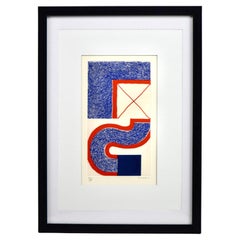Items Similar to Miyanaga Rikichi, Miyanaga Tozan III, Porcelain plaque, The Blue Corridor, 1992
Video Loading
Want more images or videos?
Request additional images or videos from the seller
1 of 11
Miyanaga Rikichi, Miyanaga Tozan III, Porcelain plaque, The Blue Corridor, 1992
$6,486.19
£4,855.08
€5,500
CA$8,926.85
A$9,949.91
CHF 5,220.37
MX$121,504.57
NOK 66,101.29
SEK 62,475.77
DKK 41,869.87
About the Item
Miyanaga Rikichi, Miyanaga Tozan III, The Blue Corridor, 1992
This rare wall plaque, titled The Blue Corridor and created in 1992 by Miyanaga Tozan III (Rikichi), reflects the artist’s subtle and poetic approach to porcelain. The surface is dominated by an intense blue glaze that shifts between azure and cobalt tones, enhancing motifs of faintly raised lines and circles with incisions.
This deep blue is not uniform; it seems to glide and blend into powdery nuances, lighter and darker, evoking plays of light and shadow that might appear in a corridor bathed in muted light. The abstract details on the surface give the work a pictorial quality, inviting the viewer to lose themselves in its visual intricacies. Discreetly signed in the lower right corner, the plaque, measuring 45 x 27.5 cm, is set in an elegant black lacquered wooden frame with rounded upper edges. This custom-made frame enhances the refined and introspective nature of the piece, with overall dimensions of 65 x 47.5 x 5 cm.
Born in Kyoto in 1935, Miyanaga Rikichi is the son of Miyanaga Tozan II. He graduated from the Faculty of Sculpture at Kyoto City University of Arts, briefly continuing his studies before leaving for the United States in 1960. There, he explored new artistic horizons at the Art Students League in New York and immersed himself in contemporary trends. Returning to Japan in the 1960s, he moved away from classical ceramic traditions, adopting a more sculptural and experimental approach. He joined the renowned Sōdeisha group, celebrated for its avant-garde ceramic innovations.
In the decades that followed, Miyanaga Tozan III developed a unique artistic language, blending traditional techniques with contemporary expressions.
A master of sometsuke and seihakuji glazes, he successfully infused modern vitality into ancestral practices.
His works have been widely exhibited in Japan and abroad, including at the National Museum of Modern Art in Kyoto and Tokyo, the Victoria and Albert Museum in London, and the Musée des Arts Décoratifs in Paris.
In 1999, he officially assumed the name Miyanaga Tozan III, thus solidifying a prestigious lineage of potters. This title not only reflects his technical mastery but also his remarkable contribution to the renewal of Japanese ceramics.
- Dimensions:Height: 25.6 in (65 cm)Width: 18.71 in (47.5 cm)Depth: 1.97 in (5 cm)
- Materials and Techniques:
- Place of Origin:
- Period:
- Date of Manufacture:1992
- Condition:
- Seller Location:PARIS, FR
- Reference Number:1stDibs: LU6491244334732
About the Seller
5.0
Recognized Seller
These prestigious sellers are industry leaders and represent the highest echelon for item quality and design.
Established in 1982
1stDibs seller since 2022
6 sales on 1stDibs
- ShippingRetrieving quote...Shipping from: PARIS, France
- Return Policy
Authenticity Guarantee
In the unlikely event there’s an issue with an item’s authenticity, contact us within 1 year for a full refund. DetailsMoney-Back Guarantee
If your item is not as described, is damaged in transit, or does not arrive, contact us within 7 days for a full refund. Details24-Hour Cancellation
You have a 24-hour grace period in which to reconsider your purchase, with no questions asked.Vetted Professional Sellers
Our world-class sellers must adhere to strict standards for service and quality, maintaining the integrity of our listings.Price-Match Guarantee
If you find that a seller listed the same item for a lower price elsewhere, we’ll match it.Trusted Global Delivery
Our best-in-class carrier network provides specialized shipping options worldwide, including custom delivery.More From This Seller
View AllCeramic Wall Plaque by Japanese artist Masano Asaru, Japan , circa 2000
Located in PARIS, FR
We are pleased to present this wall ceramic artwork by Asano Masaru.
This ceramic plaque shiws remarkable craftsmanship: the clay is hand-formed, carved, and then painted, resulting...
Category
Early 2000s Contemporary Art
Materials
Ceramic
Seiyakuji Porcelain Vase with Silver Inlay by Yoji Kato, Japan, circa 1990
Located in PARIS, FR
Seiyakuji Porcelain Vase with Silver Inlay by Yoji Kato (加藤洋二)
This contemporary Japanese vase by Yoji Kato stands 20.5 cm tall and is crafted from Seiyakuji porcelain, renowned for...
Category
Late 20th Century Japanese Vases
Materials
Porcelain
Japan, Porcelain vase by Shigekazu Nagae, 1991
Located in PARIS, FR
Born in 1953 in Seto, renowned for its long ceramic tradition, Shigekazu Nagae has established himself as one of the emblematic figures of contemporary abstract porcelain. Raised in a family of potters, he learned traditional ceramic techniques from a young age before transcending them with a resolutely modern approach. A graduate of the Seto ceramics school, he perfected his mastery of Ikomi, a porcelain casting technique, which he reinvented by integrating it into an innovative artistic approach. This vase, circa 1991, bears witness to this constant exploration of the material and aesthetic limits of porcelain. Its fluid form, enhanced by delicate undulations, seems to capture an eternal movement, evoking both the softness and tension of the molten material. These undulating patterns, forming a slight relief on the surface, already announce Nagae's current sculptural research, where forms, freed from all constraints, stretch and curve like waves frozen in time.
Nagae's work, although deeply rooted in Japanese tradition, has won international recognition. His pieces are now included in the collections of some of the most prestigious museums in the world, such as the Metropolitan Museum of Art in New York, the Musée National de Céramique in Sèvres, and the Victoria & Albert Museum in London.
In his most recent creations, Nagae continues his quest for the perfect form, transforming porcelain into a living, almost organic material. Each piece, although shaped by the chance of the firing process, is the result of a unique technical mastery and artistic vision, making Shigekazu Nagae an essential pioneer of contemporary ceramic art.
Nagae uses casting, a technique traditionally associated with mass production. However, he diverts this process to shape forms, challenging the limits of the technique.
As with this vase, his creations begin by casting rectangular pieces in slip, which are then left to dry and undergo an initial firing. The joints are then vitrified by the application of glaze, fusing the pieces into a single entity.
He quickly progresses to abstract forms for which he uses the same technique and then suspends the slip sheets in his kiln using...
Category
Late 20th Century Japanese Vases
Materials
Porcelain
Japan, Large Blue and White exhibition vase by Fuji Shumei
Located in PARIS, FR
This blue and white porcelain vase is a representative work by Fujii Shumei. Born in Arita in 1945, Fujii began his career as an apprentice in a pottery workshop at the age of 15. In...
Category
Late 20th Century Vases
Materials
Porcelain
Japan, Large decorative dish by Yasutaka Shimizu and original drawing
Located in PARIS, FR
Yasutaka Shimizu was born in 1947 in Kyoto.
The son of Uichi Shimizu, a living national treasure, he was immersed from a young age in a world where art and tradition meet.
After gra...
Category
Late 20th Century Decorative Dishes and Vide-Poche
Materials
Ceramic
Japan, Rare Vase by Kanzan Shinkai, born in 1912
Located in PARIS, FR
Vase by Kanzan Shinkai,born in 1912
This vase is a fine example of Kanzan Shinkai's work. It features an intricate design, with raised circular patterns, using contrasting colors suc...
Category
Mid-20th Century Japanese Vases
Materials
Ceramic
You May Also Like
Fine Art Japanese Porcelain Plaque Arita by Fujii Shumei Winter Landscape
By Fujii Shumei
Located in Amsterdam, Noord Holland
Lovely and rare piece with documentation.
A superb blue and white porcelain plaque, with a landscape. Made by Fuji Shumei
Fujii Mr. A...
Category
20th Century Japanese Decorative Art
Materials
Bronze
Japanese Porcelain Plaque Arita Winter Landscape by Fujii Shumei, 20th Century
Located in Amsterdam, Noord Holland
Lovely and rare piece with documentation.
A superb blue and white porcelain plaque, with a landscape. Made by Fuji Shumei
Fujii Mr. A...
Category
20th Century Japanese Showa Wall-mounted Sculptures
Materials
Bronze
Ceramic Wall Relief by Andrés Galdeano and Angel Grávalos, Spain, 1960's
Located in Barcelona, ES
Ceramic wall relief signed Muresa, trademark created by Spanish ceramists Andrés Galdeano and Angel Grávalos in 1960's. Glazed ceramic with a lacquered wooden frame. Only the ceramic...
Category
Vintage 1960s Spanish Mid-Century Modern Decorative Art
Materials
Ceramic, Wood
"Bleu" by Kumi Sugaï (1996)
By Kumi Sugai
Located in Weesp, NL
"Bleu" by Kumi Sugaï (1996)
Experience the allure of contemporary Japanese art with "Bleu," a stunning copperplate etching by the celebrated artist Kumi Sugaï. Created in 1996, this...
Category
1990s Japanese Modern Prints
Materials
Paper
"Fishermen At Kanagawa", Dimensional, Wall Sculpture, Hand Made Paper, Silver
By Katherine Glover
Located in St. Louis, MO
Glover did not begin her career as an artist. After receiving an MBA from Harvard Business School, she served as an international consultant in strategy, industry best practices, and...
Category
2010s Contemporary Paintings
Materials
Silver, Gold Leaf
Radiant Blue Painting Framed
Located in New York, NY
Heavily textured painting white paint in the middle radiates to a dark blue. Signed Walker in the bottom left. Framed in aluminium frame.
Category
20th Century American Mid-Century Modern Paintings
Materials
Canvas, Paint
More Ways To Browse
Wooden Carved Wall Plaques
Round Ceramic Wall Art
Japanese Lacquer Plaque
Japanese Wall Plaque
Vintage Metal Swan
Vintage Wire Outdoor Furniture
Western Beds
Wwii Propaganda Posters
17th Century French Aubusson Tapestry
1920s Renaissance Furniture
Antique Brass Name Plate
Antique Jasperware
Antique Upholstered Bed
Bali Antique
Block Crystal Glasses
Brutalist Flowers
Cabinet By Borge Mogensen
Chinese Zodiac
